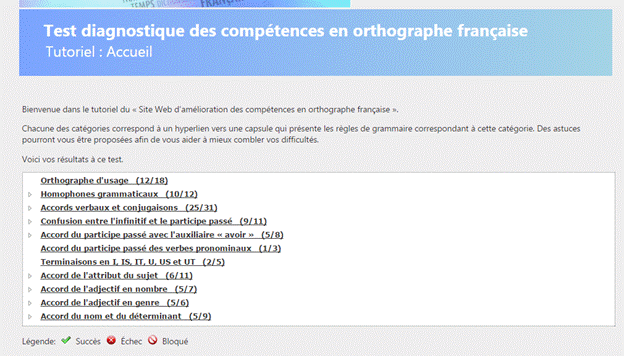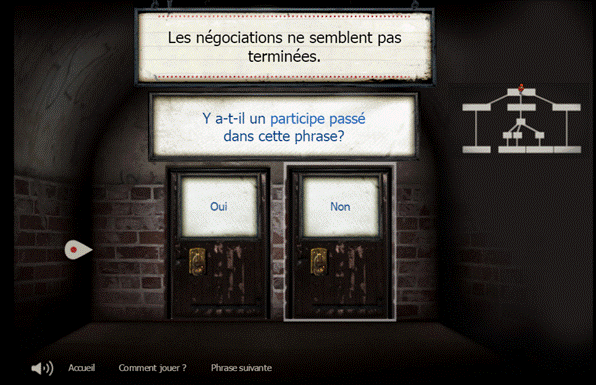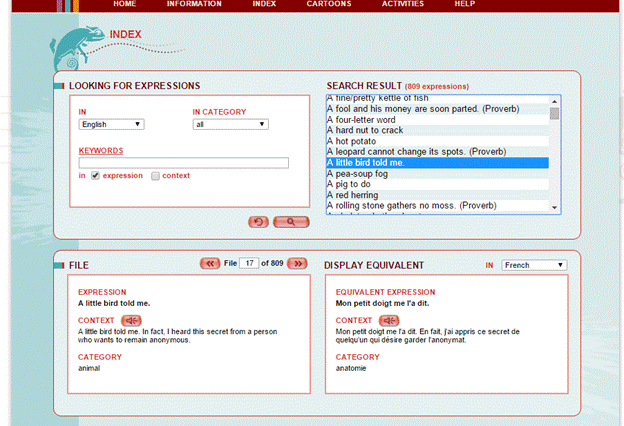Discovering Language Improvement Tools on My Journey of Learning French as a Second Language
According to the results I received from the Test diagnostique des compétences en orthographe française, I still have a lot to learn about the French language! In recognition of the Semaine de la langue française, I decided to test my French skills to see where my proficiency is now, after having lived in Québec for 16 years and working in a bilingual environment for 13 years.
The idea to take this test came from a teacher at CEGEP Limoilou who uses this test with her graduating students. You can learn more about her experience by consulting the Profweb article À la découverte d’un nouvel outil pour l’amélioration de l’orthographe française (in french). The test, which was developed by a team at the Université du Québec à Rimouski (UQAR), takes approximately 1 hour to complete. It is comprised of 110 sentences with 122 errors to correct. I successfully corrected 85 errors, but missed 37 and incorrectly modified 16. Therefore my total score is 56.6%. Not a score to be proud of, but it is a testament to the complexity of the French language. All of the grammar elements that are tested are then listed in the results, showing users where their weaknesses are. Users can also compare their responses to each of the correct answers which is a helpful tool for discovering weaknesses. The tutorial feature that accompanies the results is very beneficial, as it provides further information regarding grammar rules.

The tutorial section of the website which offers links to additional information to help users learn more.
French is a language that has carried an important meaning for me throughout my life. When I was in grade 3 or 4 I watched my father struggle to learn French for his job with cassette tapes and text books. He slaved over the dining room table for hours trying to grasp the language that had become important for his many business trips to the province of Québec. When my elementary school began a French immersion pilot project for grades 5 to 8 (elementary school is from kindergarten to grade 8 in Ontario), my father signed me up! There was no room for discussion as he saw an opportunity for me that he wished he could have had. My high school did not offer a true French immersion program, but I was able to take a variety of courses in French (such as history, physical education, enriched French, geography, etc.). These experiences gave me a solid background with the French language which made my adjustment to living in Québec easier than other Anglophones that I know.
My first months of living in Québec City were exhausting and I felt like a foreign tourist carrying my dictionary and my Bescherelle everywhere with me. I would plan what I wanted to say before going to the grocery store or to the garage to have my car fixed. Even social outings were taxing! I struggled to follow conversations, and would think through what I wanted to contribute to the conversation before saying it, only to find the discussion had moved on as I went to speak. I eventually took private French lessons to help develop my skills in general and teaching in a bilingual program has pushed me to improve my oral skills. Obviously my written skills still need some further work!
Luckily for me, there are many different tools and helpful websites that can be used to improve French skills. As previously mentioned, the test I took offers tutorials to help you learn the grammar rules associated with your errors. Although there are no practical exercises to complete, there are clear explanations to help users understand their mistakes. There is even a post-test that can be taken once the user has had a chance to do some further studying. In addition to using Antidote before I finalize any text written in French, there are other tools I can consult to help me improve my French language skills.
The Collegial Centre for Educational Materials Development (CCDMD) has several different tools. One is a game based on past participles, called Sortir de l’impasse avec les participes passés. This game has 3 different levels (beginner, intermediate and advanced).
- The user is first presented a series of doors after having fallen victim to a crime and losing consciousness. At the doors the user is asked if there is a past participle in the sentence given, or with the advanced level the user is asked to identify the past participle directly.
- Clicking on the correct door will then lead the user down a corridor that takes you to the next step in understanding the grammar concept being explained and one step closer to finding the perpetrator.
- Once all of the questions have been answered correctly, the user is led to end of the corridor and a final grammar explanation is provided.
Ironically, one of my weaknesses in the test was with past participle agreements, but when playing the CCDMD game, and isolating this grammar element, I didn’t have many errors (except at the advanced level where you must decipher very precise grammar rules).

The first question that begins the past participle game. The diagram in the upper right-hand corner shows the player how far they have progressed through the various steps of the game.
The CCDMD has also created the Amélioration du français website dedicated to improving French language skills. A menu bar on the left-hand side of the page displays the plethora of options to choose from:
- Games
- Grammar rule pages
- Exercises
- Editing strategies
- Pedagogical tools
- Material specifically designed for Allophones
I decided to try one of the games, sticking with past participles. It was a story in which you filled in the blanks, choosing the correct word from a list of multiple choice answers. When a wrong answer is selected the user is shown the correct response accompanied by an explanation of the grammar rule. My results were very good for this activity, however, as it was a children’s story, I could assume that the difficulty level was not very high. For a complete description of the Amélioration du français website, please refer to the Profweb Digital Tool Site Amélioration du français du CCDMD.
On the lighter side of languages, idiomatic expressions are often difficult, yet amusing to learn. There is a great site called 1000 Images on the Tip of My Tongue, which allows the user to look up an idiomatic expression in French, English or Spanish and to see if there is an equivalent in one of the other languages. This allows the user to learn that in English we “know the ropes” but in Québec French we “have already seen it snow” (avoir déjà vu neiger). In English we “play leapfrog” but in French they “play leap-sheep” (jouer à saute-mouton). I also discovered that, in English we “work for peanuts”, but in French we “work for plums” (travailler pour des prunes).

An example of how the site 1000 Images on the Tip of My Tongue enables users to easily look up translations for idiomatic expressions.
French is a complex language to learn and to use correctly – especially written French. My objective for the Semaine de la langue française is to work on my weaknesses and then take the test again to see if I have improved. Hopefully practice will make perfect… or c’est en forgeant qu’on devient forgeron.
Do you have success or horror stories about learning French? Do you have any favourite tools for language improvement? Please share them with us, by adding them to the comments section below.

